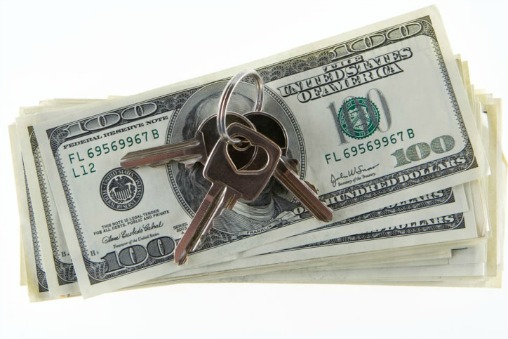Many landlords get into the rental property business with the dream of securing passive income. Income to pay the bills, fund fancy vacations, and maybe even secure a long retirement, all without having to do any work.
While passive income can become a reality for many involved in real estate, it is important to remember that passive income, it its true form, is actually not attainable because every investment requires some amount of work, even if only in the beginning.

That being said, it is possible to strive for passive income, and maybe even attain a somewhat passive income state of living, especially if you are using rental properties as a way to achieve it.
Today we will look at the fluid definition of passive income and ways to use your rental properties that some might say are actually passive forms of income.
What is Passive Income?
Real passive income is money earned while you sleep. It require no effort on your part, ever, and money simply flows into your bank account on a regular basis.
Sounds great, right?
Unfortunately this is not a reality for most, if not all, people in the world. However, passive income it its more fluid definition is possible and is very different from its counterpart, active income.
Active income is money that you earn while you work. The idea is simple. If you work, you earn. If you stop working, you stop earning.
On the other hand, the flexible definition of passive income goes something like this: work hard, maybe for a while in the beginning, and then let the money come into your life with very little, if any at all, effort on your part later down the line. The idea behind this is that at one point, no matter how much additional work you choose to do, the income will still be generated.
This is passive income in its truest state.
Passive income, regardless of the work you have put in, or the source it comes from, does not mean:
- A onetime lump sum of money you received (such as an inheritance). Though you did not work for this money, it does not count as passive income either. This just means you were lucky!
- A permanent source of income. Though many forms for passive income can last a long time, even forever, this is never guaranteed with passive income. There is always the chance the steam will dry up.
- You have no work to do. Although there are some instances where very little maintenance is required (remember, passive income means different things to everyone), in general, passive income is going to need some continual upkeep. Income such as book royalties require very little. Rental properties require new tenants, repairs and upgrades, lawsuits and evictions, and the maintenance goes on and on.
Ways to Make (Somewhat) Passive Income with Rental Properties
There are many ways a landlord can achieve a somewhat passive income using rental properties. Some of this passive income will be more easily generated than others, and some will require more startup work. The key here is that at some point, if done correctly, landlords can achieve passive income, even if it is only really considered semi-passive.
Take Advantage of the Current Market
These days, the demand for rental properties has skyrocketed. More people than ever, especially millennials, are renting for longer periods of time, if not forever. With the economy still recovering and people having trouble saving for down payments for home ownership, the market has become a landlord’s dream.

With over 40 million Americans renting right now, this is the perfect time to invest in rental properties. And if you were ever going to get close to achieve true passive income, this would be the way. As the rental demands stay high and people are stabilizing their incomes, fewer non-payers will be leasing your properties which means your monthly cash flow should remain stable and passive.
Real Estate Investment Trust (REIT)
Though more comparable to stock investments than rental property investments, REITs can provide a streamlined passive income, long-term appreciation, and diversification to your overall rental portfolio.
The idea behind a REIT is that it allows you to earn income on a rental property without the need to buy, maintain, or manage it. This type of investment is great for those who want to avoid some of the demands of directly owning a rental property. This, in addition to any rental properties you actually manage, can increase your passive income drastically.
Real Estate Notes
Real estate notes are loans that you can hold against a rental property so that when the monthly mortgage is paid, you get paid as well. You essentially become the bank when you own a note against a rental property and collect the payments that are made every month.
Just as REITs are not traditional own-and-lease methods in the rental property business, real estate notes can provide high yielding passive income and are related to rental properties. It is important to keep in mind that owning real estate notes is much different than purchasing and leasing a physical property. Make sure you do your research and know exactly what you are getting into before you take part in this path towards passive income.
Purchase a Turn-Key Property
Another option for decreasing the workload and increasing the passive income is to invest in a turn-key property. Already repaired, assigned to a property management group, and often already tenant-occupied, a turn-key property is basically a perfect property set up for you to purchase and collect money on immediately without having to do any of the leg work.
Although some general effort on your part will be required in order to maintain your property for future tenants, with a turn-key property, a lot of the difficult part is already taken care of. Plus, if you have a great property management group in place, that means you’ll have to do even less work.

Here are some considerations to keep in mind while investing in turn-key properties:
- Research the property. Though turn-key properties are supposed to be move-in ready, never assume they are in perfect shape. Always visit the property you want to invest in to make sure it is exactly what you are paying for.
- Get to know the property management group. One of the most important things in the rental property business is the customer service of a property management group, among many other things. You want to make sure the company that will be responsible for your investment is up to par.
- Understand the ownership agreement. Though many turn-key properties are sold outright to investors, other require you to become a general partner in an LLC. This means you lose some control when it comes to your investment.
In the end, the quest for passive income is one people will always be chasing. There is nothing better than doing nothing (or very little) and getting paid a lot.
If you are interested in investing in rental properties to garner you the closest things to a true passive income you can get, considering first taking on a stellar property management group, such as Bay Management Group. Taking most of the required maintenance a rental property requires off of your plate, the rent payments that are collected and deposited into your bank account each month will feel pretty darn close, if not exactly like, true passive income.
